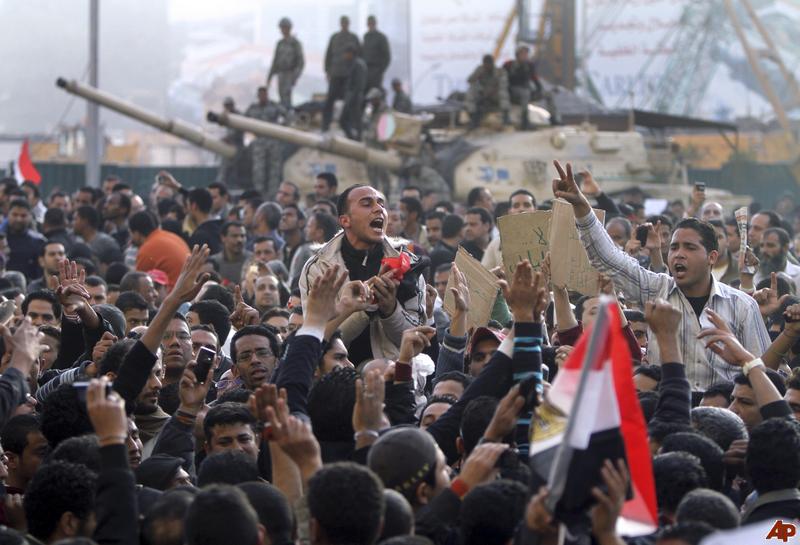CAIRO (Reuters) – Thousands of Egyptians packed Cairo’s Tahrir Square on Friday, keeping up pressure on the ruling generals to implement reforms more swiftly and to try ousted President Hosni Mubarak and his aides.
But the Muslim Brotherhood, Egypt’s most organised group, said it was not participating and said the authorities must have time to respond to demands first made at a mass rally last week.
The split partly reflects caution in the Brotherhood, banned under ousted President Hosni Mubarak, about riling the army under which it now has unprecedented freedom.
It also indicates the gap between the Brotherhood’s cautious approach and a new generation of activists, who are less well established but determined to keep pressure, analysts said.
“The youth reject the language of threats used by the Supreme Council (for the Armed Forces), and reject that this is the way for dialogue,” said Mohamed Adel of the April 6 movement, which had called for a big turnout on Friday.
Activists, some of whom have camped in the square for a week, were angered by the tone of an army statement this week that suggested protests were threatening public order.
At a news conference, generals defended the use of military courts saying they had not been used to stifle opinion but only against serious crimes. The army also said it would use all legal means to end the protest without resorting to violence.
But there has been no sign of any action to stop the protest in Cairo or in other cities where demonstrators have rallied.
Thousands defied the scorching sun as they lined up in Cairo’s Tahrir Square, Alexandria and Suez for noon prayers. Numbers tend to climb after prayers, when the summer heat cools in the afternoon and evening.
“Down, down with the rule of the military,” one group chanted in Tahrir.
Others demanded swift trials for policemen who killed demonstrators. A preacher, Muzhar Shaheen, said the demonstrators would not leave until all demands were met.
Osama El Ghazali Harb, a founder of the Democratic Front Party, said Egyptians wanted to see change on the ground.
“The Egyptian people feel that the demands that drove them to the streets have not been achieved,” he said, sitting under a white canopy in the centre of the square.
FIRING OFFICIALS
The army has also said it backs the prime minister, Essam Sharaf, who is working on a cabinet reshuffle. Other concessions include a shakeup of hundreds of senior officers in the police, a force scorned for violent tactics used under Mubarak.
“Purging all state institutions and particularly the judiciary,” is one of the demands listed by April 6.
The movement has named officials still in place that it wants fired. It has also demanded that military courts, long used by Mubarak, should not be used for civilians.
Among the demonstrators is Muhammed Fawzy, who said he began a hunger strike in Tahrir on July 10 and only drinks water. He wants a dialogue with the army about his demands, such as setting up an independent committee to draw up a constitution.
The Brotherhood said it would stay away. The group is widely seen to have benefited most from the army’s policies, such as the military’s drive for a swift election, although voting has been pushed back to November from September.
“We will not participate today. That does not mean that we are against demonstrating or against continuing the revolution strongly. But we … participated last Friday in big numbers and with specific demands and we say we must give a chance in each period for our demands to be met,” Mohamed Morsy, head of the Brotherhood’s political Freedom and Justice party, told Reuters.
“If they are not met enough we will return again to the square, and not just there, but to all squares,” he said.
The Brotherhood, though banned under Mubarak, was given enough room to build a broad network of support through social and charity work. It also ran candidates as independents in parliament elections, winning 20 percent of seats in 2005.
Hassan Nafaa, a political scientist and activist, said the Brotherhood might be wary of antagonising the military council when the group now has more freedom to act than any time before.
Nafaa said the army may had tended to side with Islamists believing it was the best way to control the streets, adding: “The military council should understand now that the Muslim Brotherhood and Islamist trend is not the whole scene.”
(Additional reporting by Omar Fahmy in Cairo, Yusri Mohamed in Suez and Adel Rahman Youssef in Alexandria)



